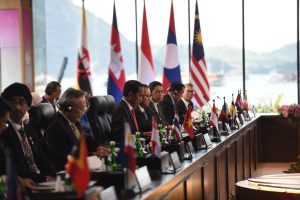Is there anything that the Association of Southeast Asian Nations (ASEAN) can do to address the crisis in Myanmar? The question once again presented itself after the conclusion of the bloc’s summit in Labuan Bajo, Indonesia, last Thursday.
In the Chairman’s Statement issued at the close of the meeting, the bloc’s members said that they remained “deeply concerned on the escalation of the armed conflicts and violence in Myanmar,” and urged an “immediate cessation of all forms of violence to create a conducive environment for the delivery of humanitarian assistance and inclusive national dialogues.”
The statement also “strongly condemned” a recent attack on an ASEAN humanitarian convoy, and said that the bloc “will continue to mobilize additional resources and take the lead in the provision of humanitarian assistance.”
ASEAN has struggled to address the crisis prompted by the military’s takeover in February 2021, which led to the eruption of a nationwide civil war between the junta and the loose alignment of groups opposed to its rule. Indeed, despite the Southeast Asian bloc’s agreement of a peace roadmap known as the Five-Point Consensus in April of that year, the military junta ruling in Naypyidaw (and a narrowing rump of the central and deltaic regions of the country) has done virtually nothing to implement it, which would, of course, require it to compromise with groups that it views as enemies and “terrorists.” As such, ASEAN’s best efforts notwithstanding, the country’s political crisis shows no signs of resolution, and by some measures appears to be worsening. The most recent sign of this was the horrific air strike by the military last month in Sagaing Region, which is estimated to have killed around 170 people, including many children.
This and other recent outrages have led to various calls, from both within and outside ASEAN, for the bloc to rethink its approach to its perennial problem member. Indonesia, the current chair of ASEAN, was among those member states most frustrated by the military government’s lack of efforts to implement the Five-Point Consensus, and it was widely expected that it would take a harder line against the military junta.
This makes it all the more puzzling that last week’s Chairman’s Statement did not advance in any significant way beyond the statement issued at the close of the last ASEAN Summit in Phnom Penh in November, nor the statement issued by Chair Cambodia in August.
Indeed, in certain ways, last week’s statement was significantly less forthright. The November statement at least referenced the fact that the bloc’s member states were “deeply disappointed by the little progress in and lack of commitment of the Nay Pyi Taw authorities to the timely and complete implementation of the Five-Point Consensus.” This came after a chairman’s statement issued in August, in response to the junta’s execution of four pro-democracy campaigners, while condemning the “highly reprehensible” act and said it displayed the junta’s “gross lack of will” to implement the Consensus.
Conversely, the statement produced under Indonesia’s leadership last week took pains to reaffirm the bloc’s Five-Point Consensus peace plan as the “main reference” for ASEAN’s efforts to address the crisis, despite the junta’s continuing lack of efforts to implement the agreement. Its importance was attested by the fact that it was referenced in the opening sentence of the paragraph pertaining to Myanmar. Calls for more “concrete, practical, and time-bound actions” by Myanmar’s military to implement the plan, advanced by ASEAN foreign ministers at a special meeting last October, do not appear to have amounted to much.
There are of course limits to how critical such a statement can be. While Chairman’s Statements do not require the consensus of all 10 member states – unlike the bloc’s joint communiques and declarations – it is customary that they take on board and reflect accurately the opinion of the various members.
Another way of explaining the relative limpness of the statement is that Indonesia is focusing on substantive backroom discussions over public posturing and criticism. Last week, Foreign Minister Retno Marsudi revealed that diplomats under her watch had now held more than 60 “engagements” with the main warring parties, which in addition to the military junta also include ethnic armed organizations and the opposition National Unity Government, in order to bring them to the table.
“Quiet diplomacy does not mean we did not do anything,” Retno told reporters after the summit. “We will try again and again… We are still united and strong in seeing the urgency of the Five-Point Consensus.” Whether these efforts will bear fruit remains to be seen.
Still, the fact that the statement has considerably softened since last year points perhaps to the continuing, even deepening, divergence among ASEAN states about how to address the Myanmar question, as evidenced by the “non-ASEAN” meetings that have were convened recently by Thailand and India. Notably, in addition to Myanmar’s military government, both were attended by Cambodia, Thailand, Laos, and Vietnam – the ASEAN members that have taken the most accommodating position toward the junta in Naypyidaw. This was something that Indonesian President Joko “Jokowi” Widodo seemed to acknowledge when he called for “unity” among ASEAN’s 10 members on the final day of their two-day summit, while admitting the bloc’s lack of progress.
Where things go from here is hard to determine, but if Indonesian efforts do not make headway, and ASEAN remains deadlocked, there is every chance that other actors will move in to fill the void.

































